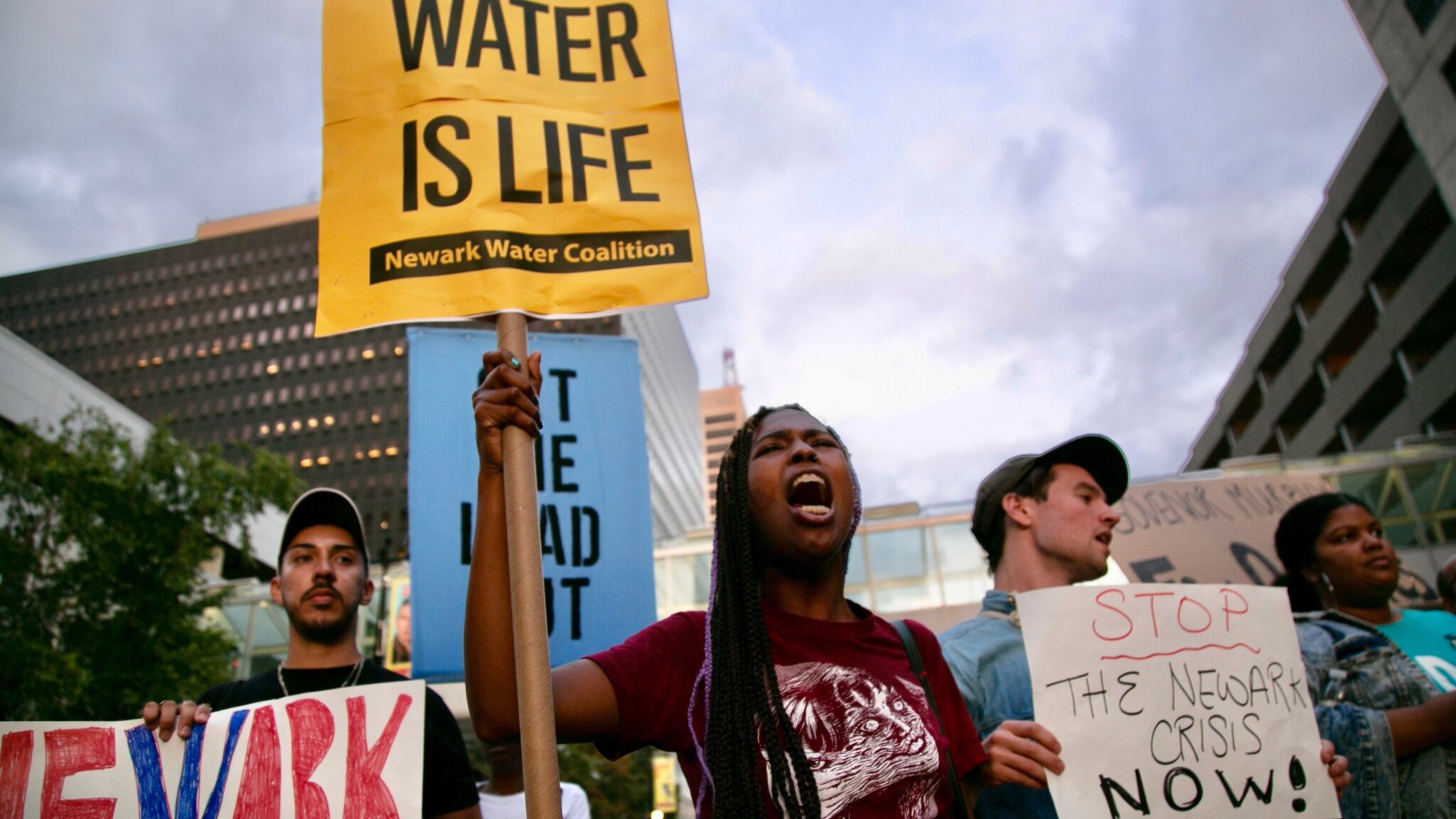
Water Inequality Used to Be a Developing World Problem Only. Not Any More.

Protestors marched outside the Prudential Center in Newark, New Jersey on Monday, August 26, during the MTV Video and Music Awards to bring attention to the water crisis currently gripping the city. Karla Ann Cote / NurPhoto / Getty Images
By Will Sarni
It is far too easy to view scarcity and poor quality of water as issues solely affecting emerging economies. While the images of women and children fetching water in Africa and a lack of access to water in India are deeply disturbing, this is not the complete picture.
The city of Flint, Michigan, where dangerous levels of pollutants contaminated the municipal water supply, is a case in point — as is, more recently, the city of Newark, New Jersey.
The Past Is No Longer a Guide to the Future
We get ever closer to “day zeros” — the point at when municipal water supplies are switched off — and tragedies such as Flint. These are not isolated stories. Instead they are becoming routine, and the public sector and civil society are scrambling to address them. We are seeing “day zeros” in South Africa, India, Australia and elsewhere, and we are now detecting lead contamination in drinking water in cities across the U.S.
“Day zero” is the result of water planning by looking in the rear-view mirror. The past is no longer a guide to the future; water demand has outstripped supplies because we are tied to business-as-usual planning practices and water prices, and this goes hand-in-hand with the inability of the public sector to factor the impacts of climate change into long-term water planning. Lead in drinking water is the result of lead pipe service lines that have not been replaced and in many cases only recently identified by utilities, governments and customers. An estimated 22 million people in the U.S. are potentially using lead water service lines. This aging infrastructure won’t repair or replace itself.
One of the most troubling aspects of the global water crisis is that those least able to afford access to water are also the ones who pay a disproportionately high percentage of their income for it. A report by WaterAid revealed that a standard water bill in developed countries is as little as 0.1 percent of the income of someone earning the minimum wage, while in a country like Madagascar a person reliant on a tanker truck for their water supply would spend as much as 45 percent of their daily income on water to get just the recommended daily minimum supply. In Mozambique, families relying on black-market vendors will spend up to 100 times as much on water as those reached by government-subsidized water supplies.
Finally, we need to understand that the discussion of a projected gap between supply and demand is misleading. There is no gap, only poor choices around allocation. The wealthy will have access to water, and the poor will pay more for water of questionable quality. From Flint residents using bottled water and paying high water utility rates, to the poor in South Africa waiting in line for their allocation of water — inequity is everywhere.
Water Inequity Requires Global Action — Now.
These troubling scenarios beg the obvious question: What to do? We do know that ongoing reports on the ‘water crisis’ are not going to catalyze action to address water scarcity, poor quality, access and affordability. Ensuring the human right to water feels distant at times.
We need to mobilize an ecosystem of stakeholders to be fully engaged in developing and scaling solutions. The public sector, private sector, NGOs, entrepreneurs, investors, academics and civil society must all be engaged in solving water scarcity and quality problems. Each stakeholder brings unique skills, scale and speed of impact (for example, entrepreneurs are fast but lack scale, while conversely the public sector is slow but has scale).
We also urgently need to change how we talk about water. We consistently talk about droughts happening across the globe — but what we are really dealing with is an overallocation of water due to business-as-usual practices and the impacts of climate change.
We need to democratize access to water data and actionable information. Imagine providing anyone with a smartphone the ability to know, on a real-time basis, the quality of their drinking water and actions to secure safe water. Putting this information in the hands of civil society instead or solely relying on centralized regulatory agencies and utilities will change public policies.
Will Sarni is the founder and CEO of Water Foundry.
Note: This post also appears on the World Economic Forum.
Reposted with permission from our media associate Circle of Blue.
- Newark Water Filters Are Working, Tests Suggest - EcoWatch
- Newark's Lead Crisis Escalates - EcoWatch

 233k
233k  41k
41k  Subscribe
Subscribe 